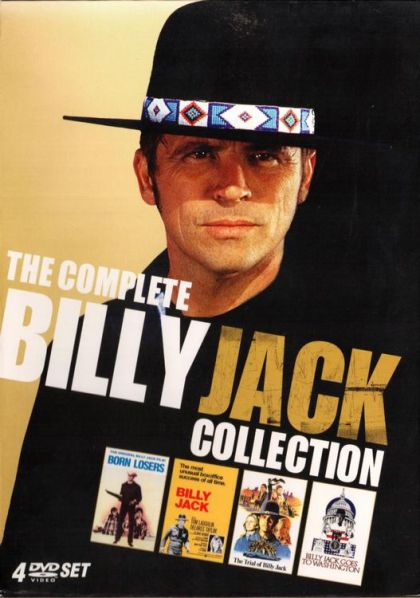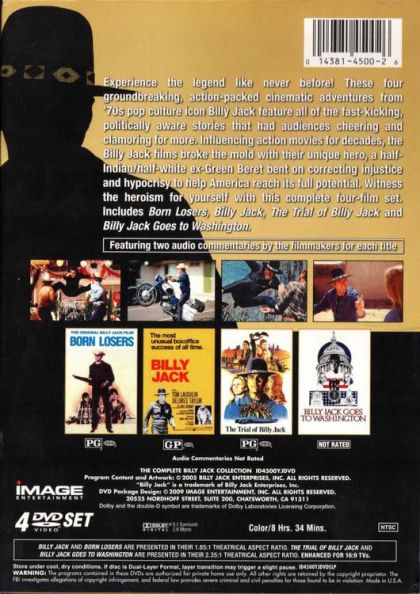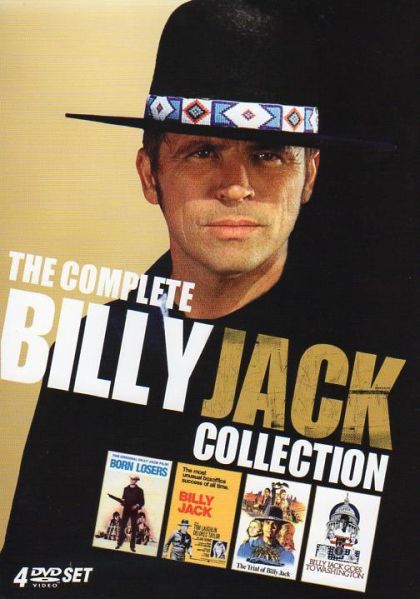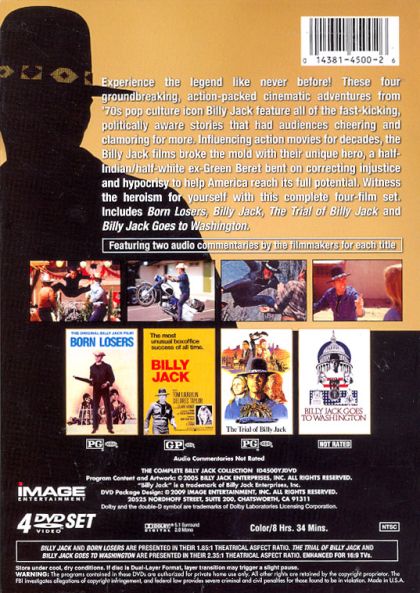Ex-Green Beret hapkido expert saves wild horses from being slaughtered for dog food and helps protect a desert "freedom school" for runaway.
Billy Jack is a half-Indian/half-white ex-Green Beret who is being drawn more and more toward his Indian side. He hates violence, but can't get away from it in the white man's world. Pitting the good guys, the students of the peace-loving free-arts school in the desert vs. the conservative bad guys in the near-by town, the movie plays definitive late-60s themes/messages: anti-establishment, make love not war, the senseless slaughter of God's creatures, the rape of society (figuratively and literally), two-sided justice, racial segregation and prejudices, and basic socialist ideals.
Written by Nic Cage <2cool@zebra.net>
SYNOPSIS
Hey folks:
Can you all stand another movie review? This is not my all-time favorite film, West Side Story, but another movie that I one day decided to rent the DVD from our local Public Library and watch it on my computer. Since I enjoy action films generally and enjoy stories that deal with intergroup conflict, fighting, love, etc., all wrapped in one package, I decided, in somewhat dippy inspiration, to borrow the DVD of the film Billy Jack from the Library. Although I have a DVD player built into my computer, this particular DVD movie is pretty tough to come by. Although the movie Billy Jack doesn't hold nearly the special place in my heart regarding movies as West Side Story, and it's somewhat campy in some ways, I rather enjoyed it. That saying, here goes:
Set in the late 1960's, the movie Billy Jack is about a man who's half white and half Cherokee Indian, is a (turned anti-war) ex-Green Beret Viet Nam Vet and an expert at the Korean martial art Hapkido (a combination of Tae Kwon Do and Aikido) who returns from the war to take solitary residence in the nearby Indian Reservation, which is located near a conservative Arizona town, due to becoming more in touch with his Native American roots. He quickly becomes the protector of the wild Mustang horses, the progressive "Freedom School" which is directed by a kindly teacher named Jean Roberts, and the Native Americans on the reservation.
Billy Jack, along with Jean Roberts and the Freedom school, and the Native Americans frequently have trouble with local town bigots, especially Sheriff Stuart Posner and his son, Bernard, as well as the Deputy Sheriff, Mike, whose pregnant, sick 15-year-old daughter had been found in San Francisco's Haight-Ashbury district after running away from her abusive father and was flown home to Phoenix. Once more, when Barbara arrives home from San Francisco and is in her father's house, she experiences another beating after telling her father what's going on, runs away from home once more, and is found sleeping in an open field by Billy Jack, who helps hide her out at the "Freedom" School.
At first, Stu Posner's son, Bernard, seems like a persom to be sympathized with after he refuses to shoot any of the wild Mustang horses on the Reservation to sell as dog food for six cents a pound, like his father wants him to, but after helping to cause much trouble for the Freedom School in the hopes of making his father proud of him by trying to hit on a couple of female students at the school without success, verbally and physically abusing the Freedom School students when they go into town, especially the Native American students, brutally raping "Freedom School" director Jean Roberts, and then, ultimately shooting and killing Martin, a gentle Native American boy who's befriended Barbara and taught her that there are other ways to obtain love than through easy sex, it's clear that Bernard deserves little or no sympathy, although he does admit to wanting to make his father proud despite hating him.
Mike, the Deputy Sheriff, as well as the Posners (both father and son), and many, if not most of the townspeople, are quite bigoted against non-whites and peace-oriented whites alike. The hatred and resentment emerges more and more as it becomes known that the Freedom School is not only open to kids of all racial/ethnic backgrounds with problems of some sort or other, but is also a very unconventional school, with few rules.
Meanwhile, in the wake of Martin's killing, as well as the brutal rape of Jean Roberts, Billy Jack ultimately gets his revenge, despite Jean's warnings about the possible dissolution of the Freedom School, and harm to the kids. Billy then hunts down Bernard Posner, finds him making out sexually with an underage 13-year-old girl in a shabby hotel room on the edge of town, and warns the girl to get out, which she does. Bernard then tries to kill Billy Jack by shooting at him, and Billy Jack, in turn, kills Bernard with a karate chop across the throat.
Billy Jack and Barbara hide from the law in the old church on the edge of town. A shoot-out between Billy Jack and the law ensues, in which Billy Jack shoots and kills Mike. Billy Jack, who receives a gunshot wound to the stomach, stays in the church all night with Barbara, who is slightly wounded by gunfire. After hiding out in the church all night, Billy Jack finally surrenders to the law and gives himself up, under several conditions:
A) That the Freedom School be allowed to run for the next ten years with no interference, with Jean Roberts beginning a ten-year contract as the school's director.
B) That Jean Roberts have custody of Barbara and become Barbara's legal guardian.
C) That an annual press conference be held by somebody from the governor's office to report on the school's progress.
The conditions are OK'd by Washington, and, after a few minutes of tearful hugs and good-byes between him and Jean, Billy Jack allows himself to be handcuffed and taken out to be tried for the killings of Bernard Posner and Barbara's father, Mike. Meanwhile, the kids at the Freedom School gather outside to wave Billy Jack goodbye, with the Black Power raised fist signs, and many tears, to boot.
I believe that the movie Billy Jack sends a mixed message; that fighting back for survival in the face of lawlessness, racism and corruptioj is necessary, and, yet, when lawlessness prevails, it begets more lawlessness, violence and corruption. Racism against the Indians is prevalent, and that, too, has led to tragedy and bloodshed.
Tom Laughlin, who has written the script for and directed this film, does a wonderful job of playing Billy Jack, and Delores Taylor (who is Tom Laughlin's wife) does an equally good job of playing the more pacific Jean Roberts, the director of the Freedom School. David Roya does a cool job of playing the vengeful but cowardly Bernard Posner, the son of the town commissioner, Stuart Posner who also shoots wild horses to sell as dog food at six cents a pound, and Julie Webb also does a good job of playing the part of 15-year-old Barbara, who turns out to be quite messed up, instead of maturing. Nobody knows what happens to Barbara in the end, however. The movie leaves it that way.
The best scenes in the movie are when Billy Jack takes on a bunch of local toughs in the city park and uses his martial arts skill in self-defense against them. The slowest and dullest scenes are when the kids either sing campy folk songs, or indulge in campy drama in the hopes of making some sort of rapport with the townspeople, which, unfortunately, doesn't work, on the long run.
The movie Billy Jack sends a message, that, while it's necessary to fight back for survival in the face of lawlessness, violence, racism and corruption, things can ultimately go too far, as the killings indicate.








 English
English  Nederlands
Nederlands  Deutsch
Deutsch  Français
Français  Español
Español  Magyar
Magyar  српски
српски  Dansk
Dansk  Italiano
Italiano  Svenska
Svenska  Slovenčina
Slovenčina  Português
Português 


